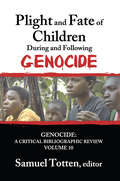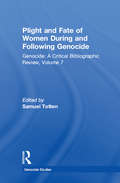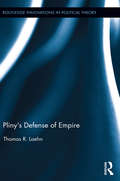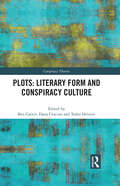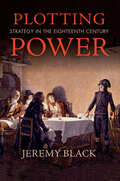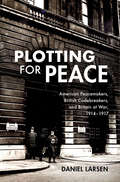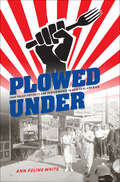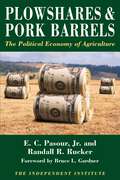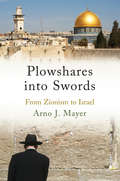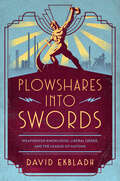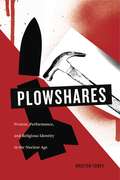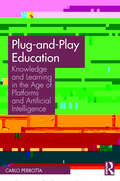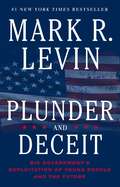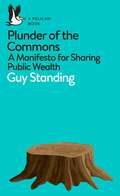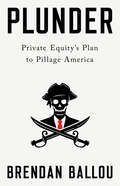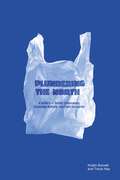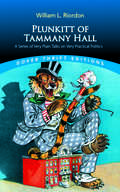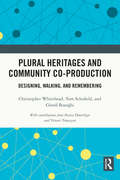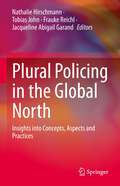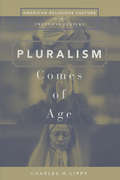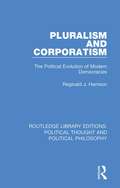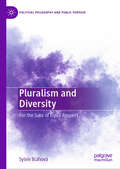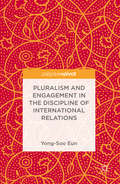- Table View
- List View
Plight and Fate of Children During and Following Genocide (Genocide: A Critical Bibliographic Review Ser.)
by Samuel TottenPlight and Fate of Children During and Following Genocide examines why and how children were mistreated during genocides in the twentieth and twenty-first centuries. Among the cases examined are the Australian Aboriginals, the Armenian genocide, the Holocaust, the Mayans in Guatemala, the 1994 Rwanda genocide, and the genocide in Darfur. Two additional chapters examine the issues of sexual and gender-based violence against children and the phenomenon of child soldiers.Following an introduction by Samuel Totten, the essays include: "Australia's Aboriginal Children"; "Hell is for Children"; "Children: The Most Vulnerable Victims of the Armenian Genocide"; "Children and the Holocaust"; "The Fate of Mentally and Physically Disabled Children in Nazi Germany"; "The Plight and Fate of Children vis-a-vis the Guatemalan Genocide"; "The Plight of Children During and Following the 1994 Rwandan Genocide"; "Darfur Genocide"; "Sexual and Gender-Based Violence against Children during Genocide"; and, "Child Soldiers." Contributors include: Colin Tatz, Henry C. Theriault, Asya Darbinyan, Rubina Peroomian, Jeffrey Blutinger, Amanda Grzyb, Elisa von Joeden-Forgey, Sara Demir, Hannibal Travis, and Samuel Totten.The editor and several of the contributors have personally investigated and witnessed the aftermath of genocidal campaigns.
Plight and Fate of Women During and Following Genocide: Volume 7, Genocide - A Critical Bibliographic Review (Genocide Studies)
by Samuel TottenThe plight and fate of female victims during the course of genocide is radically and profoundly different from their male counterparts. Like males, female victims suffer demonization, ostracism, discrimination, and deprivation of their basic human rights. They are often rounded up, deported, and killed. But, unlike most men, women are subjected to rape, gang rape, and mass rape. Such assaults and degradation can, and often do, result in horrible injuries to their reproductive systems and unwanted pregnancies. This volume takes one stride towards assessing these grievances, and argues against policies calculated to continue such indifference to great human suffering.The horror and pain suffered by females does not end with the act of rape. There is always the fear, and reality, of being infected with HIV/AIDS. Concomitantly, there is the possibility of becoming pregnant.Then, there is the birth of the babies. For some, the very sight of the babies and children reminds mothers of the horrific violations they suffered. When mothers harbor deep-seated hatred or distain for such children, it results in more misery. The hatred may be so great that children born of rape leave home early in order to fend for themselves on the street.This seventh volume in the Genocide series will provoke debate, discussion, reflection and, ultimately, action. The issues presented include ongoing mass rape of girls and women during periods of war and genocide, ostracism of female victims, terrible psychological and physical wounds, the plight of offspring resulting from rapes, and the critical need for medical and psychological services.
Pliny's Defense of Empire (Routledge Innovations in Political Theory)
by Thomas R. LaehnDespite perennial interest in Pliny the Elder’s Natural History, the world’s first encyclopedia, as a record of the prodigious, the quotidian, and the useful in Rome in the first century AD, for centuries Pliny has been derided as little more than an inept compiler of facts and marvels intellectually incapable of formulating a cogent argument supported through the selective marshaling of his materials. In Pliny’s Defense of Empire, Laehn offers a radical reinterpretation of the architecture of Pliny’s encyclopedia, exposing fundamental errors in the inherited understanding of the text traceable to its initial reception in ancient Rome. Recognition of the text’s true structure reveals that Pliny’s encyclopedia is in fact a first-rate work of political philosophy constituting an apology for Roman imperial expansionism grounded in a sophisticated account of human nature. Correcting the accreted errors and prejudices of nearly 2,000 years of faulty Plinian scholarship, Laehn critically examines one of the most persuasive apologies for the Roman Empire ever written and succeeds in rehabilitating the Elder Pliny as one of the world’s greatest political thinkers. An excellent resource and a must read for scholars in political theory, philosophy, and classical studies.
Plots: Literary Form and Conspiracy Culture (Conspiracy Theories)
by Ben CarverThis edited collection contributes to the study of conspiracy culture by analysing the relationship of literary forms to the formation, reception, and transformation of conspiracy theories. Conspiracy theories are narratives, and their narrative form provides the structure within which their ‘readers’ situate themselves when interpreting the world and its history. At the same time, conspiracist interpretations of the world may then be transmediated into works of literature and import popular discourse into narrative structures. The suppression and disappearance of books themselves may generate conspiracy theories and become co-opted into political dissent. Additionally, literary criticism itself is shown to adopt conspiracist modes of interpretation. By examining conspiracy plots as literary plots, with narrative, rhetorical, and symbolic characteristics, this volume is the first systematic study of how conspiracy culture in American and European history is the consequence of its interactions with literature. This book will be of great interest to researchers of conspiracy theories, literature, and literary criticism.
Plotting Power: Strategy in the Eighteenth Century
by Jeremy BlackAn examination of strategy in war and international relations that links military ideas and practice, political concepts, diplomacy, and geopolitics.Military strategy takes place as much on broad national and international stages as on battlefields. In a brilliant reimagining of the impetus and scope of eighteenth-century warfare, historian Jeremy Black takes us far and wide, from the battlefields and global maneuvers in North America and Europe to the military machinations and plotting of such Asian powers as China, Japan, Burma, Vietnam, and Siam. Europeans coined the term “strategy” only two centuries ago, but strategy as a concept has been practiced globally throughout history. Taking issue with traditional military historians, Black argues persuasively that strategy was as much political as battlefield tactics and that plotting power did not always involve outright warfare but also global considerations of alliance building, trade agreements, and intimidation.“This is both an overview of eighteenth-century warfare and an interpretation of how war was made; a polemical contribution to a debate on the nature of strategy; and a contribution to global history.” —Alan Forrest, author of Napoleon: Life, Legacy, and Image: A Biography“A refreshing new look at how meanings behind these terms [strategy and strategic culture] were understood and employed in the eighteenth century. With his vast knowledge and insights of the period, he is able to take us on a wide-ranging exploration that provides stimulating food for thought for historians of all periods.” —Richard Harding, author of The Emergence of Britain’s Global Naval Supremacy: The War of 1739-1748
Plotting for Peace: American Peacemakers, British Codebreakers, and Britain at War, 1914–1917
by Daniel LarsenWith Britain by late 1916 facing the prospect of an economic crisis and increasingly dependent on the US, rival factions in Asquith's government battled over whether or not to seek a negotiated end to the First World War. In this riveting new account, Daniel Larsen tells the full story for the first time of how Asquith and his supporters secretly sought to end the war. He shows how they supported President Woodrow Wilson's efforts to convene a peace conference and how British intelligence, clandestinely breaking American codes, aimed to sabotage these peace efforts and aided Asquith's rivals. With Britain reading and decrypting all US diplomatic telegrams between Europe and Washington, these decrypts were used in a battle between the Treasury, which was terrified of looming financial catastrophe, and Lloyd George and the generals. This book's findings transform our understanding of British strategy and international diplomacy during the war.
Plowed Under: Food Policy Protests and Performance in New Deal America
by Ann Folino WhiteA study of Depression-era anger at food waste: “An invaluable contribution to history, theater history, cultural studies, American studies, and other fields.” —Journal of American HistoryDuring the Great Depression, with thousands on bread lines, farmers were instructed by the New Deal Agricultural Adjustment Act to produce less food in order to stabilize food prices and restore the market economy. Fruit was left to rot on trees, crops were plowed under, and millions of piglets and sows were slaughtered and discarded. Many Americans saw the government action as a senseless waste of food that left the hungry to starve, initiating public protests against food and farm policy.Ann F. White approaches these events as performances where competing notions of morality and citizenship were acted out, often along lines marked by class, race, and gender. The actions range from the “Milk War” that pitted National Guardsmen against dairymen who were dumping milk, to the meat boycott staged by Polish-American women in Michigan, and from the black sharecroppers’ protest to restore agricultural jobs in Missouri to the protest theater of the Federal Theater Project. White provides a riveting account of the theatrical strategies used by consumers, farmers, agricultural laborers, and the federal government to negotiate competing rights to food and the moral contradictions of capitalist society in times of economic crisis.
Plowshares & Pork Barrels: The Political Economy of Agriculture
by E. C. Pasour Jr. Randall R. RuckerPlowshares & Pork Barrels provides the historical and economic context necessary to make sense of U.S. agricultural policy and examines possible market-based alternatives that could benefit consumers and ensure the advancement of American agriculture in an increasingly interdependent global economy.Established in 1860, the U.S. Department of Agriculture has grown without cease and is now the most entrenched of all federal agencies. The Farm Bills signed by Presidents Bill Clinton in 1996 and George W. Bush in 2002 only served to further expand this byzantine system. Economists are nearly unanimous in their denunciation of this wasteful and pernicious web of politics. Subsidies for not growing crops are so notorious that they have been the object of biting political satire since their introduction in the 1930s. However, few books have critically analyzed government farm programs in their entirety like Plowshares & Pork Barrels.
Plowshares into Swords: From Zionism to Israel
by Arno J. MayerThis rich, authoritative history chronicles the Zionist Israeli quest from itsorigins in pre-Great War Europe. Plowshares Into Swords traces the development of political Zionism's primal resolve to implant a state for Jews in a Middle East of ever greater strategic importance. In it, Mayer provides newperspectives on key turning points as well as on such enduring issues as the young country's dire need for imperial protection, the oil imperative, the hidden ascendance of Jabotinsky's martial and expansionist canon, and reliance on the American Jewish and Christian evangelical lobbies. He examines, too, the post-colonial backlash against Western supremacy, the asymmetry of power between Israelis and Palestinians, the Zionist Israeli leaders studied prevarication on borders, and the emergence of political Judaism and political Islam.Incorporating reflections on founding violence, sovereignty, resistance, terror, and religious politics, Plowshares into Swords is an absorbing, challenging narrative of Zionism and Israel in the context of world history.
Plowshares into Swords: Weaponized Knowledge, Liberal Order, and the League of Nations
by David EkbladhAn in-depth look at how the ideas formulated by the interwar League of Nations shaped American thinking on the modern global order. In Plowshares into Swords, David Ekbladh recaptures the power of knowledge and information developed between World War I and World War II by an international society of institutions and individuals committed to liberal international order and given focus by the League of Nations in Geneva. That information and analysis revolutionized critical debates in a world in crisis. In doing so, Ekbladh transforms conventional understandings of the United States’ postwar hegemony, showing that important elements of it were profoundly influenced by ideas that emerged from international exchanges. The League’s work was one part of a larger transnational movement that included the United States and which saw the emergence of concepts like national income, gross domestic product, and other attempts to define and improve the standards of living, as well as new approaches to old questions about the role of government. Forged as tools for peace these ideas were beaten into weapons as World War II threatened. Ekbladh recounts how, though the US had never been a member of the organization, vital parts of the League were rescued after the fall of France in 1940 and given asylum at the Institute for Advanced Study in Princeton. However, this presence in the US is just one reason its already well-regarded economic analyses and example were readily mobilized by influential American and international figures for an Allied “war of ideas,” plans for a postwar world, and even blueprints for the new United Nations. How did this body of information become so valuable? As Ekbladh makes clear, the answer is that information and analysis themselves became crucial currencies in global affairs: to sustain a modern, liberal global order, a steady stream of information about economics, politics, and society was, and remains, indispensable.
Plowshares into Swords: Weaponized Knowledge, Liberal Order, and the League of Nations
by David EkbladhAn in-depth look at how the ideas formulated by the interwar League of Nations shaped American thinking on the modern global order. In Plowshares into Swords, David Ekbladh recaptures the power of knowledge and information developed between World War I and World War II by an international society of institutions and individuals committed to liberal international order and given focus by the League of Nations in Geneva. That information and analysis revolutionized critical debates in a world in crisis. In doing so, Ekbladh transforms conventional understandings of the United States’ postwar hegemony, showing that important elements of it were profoundly influenced by ideas that emerged from international exchanges. The League’s work was one part of a larger transnational movement that included the United States and which saw the emergence of concepts like national income, gross domestic product, and other attempts to define and improve the standards of living, as well as new approaches to old questions about the role of government. Forged as tools for peace these ideas were beaten into weapons as World War II threatened. Ekbladh recounts how, though the US had never been a member of the organization, vital parts of the League were rescued after the fall of France in 1940 and given asylum at the Institute for Advanced Study in Princeton. However, this presence in the US is just one reason its already well-regarded economic analyses and example were readily mobilized by influential American and international figures for an Allied “war of ideas,” plans for a postwar world, and even blueprints for the new United Nations. How did this body of information become so valuable? As Ekbladh makes clear, the answer is that information and analysis themselves became crucial currencies in global affairs: to sustain a modern, liberal global order, a steady stream of information about economics, politics, and society was, and remains, indispensable.
Plowshares: Protest, Performance, and Religious Identity in the Nuclear Age
by Kristen TobeyIn September 1980, eight Catholic activists made their way into a Pennsylvania General Electric plant housing parts for nuclear missiles. Evading security guards, these activists pounded on missile nose cones with hammers and then covered the cones in their own blood. This act of nonviolent resistance was their answer to calls for prophetic witness in the Old Testament: “They shall beat their swords into plowshares, and their spears into pruning hooks. Nation shall not take up sword against nation; they shall never again know war.”Plowshares explores the closely interwoven religious and social significance of the group’s use of performance to achieve its goals. It looks at the group’s acts of civil disobedience, such as that undertaken at the GE plant in 1980, and the Plowshares’ behavior at the legal trials that result from these protests. Interpreting the Bible as a mandate to enact God’s kingdom through political resistance, the Plowshares work toward “symbolic disarmament,” with the aim of eradicating nuclear weapons.Plowshares activists continue to carry out such “divine obediences” against facilities where equipment used in the production or deployment of nuclear weapons is manufactured or stored. Whether one agrees or disagrees with their actions, this volume helps us better understand their motivations, logic, identity, and ultimate goal.
Plug-and-Play Education: Knowledge and Learning in the Age of Platforms and Artificial Intelligence
by Carlo PerrottaPlug-and-Play Education: Knowledge and Learning in the Age of Platforms and Artificial Intelligence documents and critiques how the education sector is changing with the advancement of ubiquitous edtech platforms and automation. As programmability and computation reengineer institutions towards efficiency and prediction, the perpetual collection of and access to digital data is creating complex opportunities and concerns. Drawing from research into secondary and higher education settings, this book examines the influence of digital “infrastructuring”, the automation of teaching and learning, and the very purpose of education in a context of growing platformisation and artificial intelligence integration. These theoretical, practical, and policy-oriented insights will offer educational technologists, designers, researchers, and policymakers a more inclusive, diverse, and open-ended perspective on the design and implementation of learning technologies.
Plunder and Deceit: Big Government's Exploitation of Young People and the Future
by Mark R. Levin#1 New York Times bestselling author and radio host Mark R. Levin delivers a "bracing meditation” (National Review) on the ways our government has failed the next generation.In modern America, the civil society is being steadily devoured by a ubiquitous federal government. But as the government grows into an increasingly authoritarian and centralized federal Leviathan, many parents continue to tolerate, if not enthusiastically champion, grievous public policies that threaten their children and successive generations with a grim future at the hands of a brazenly expanding and imploding entitlement state poised to burden them with massive debt, mediocre education, waves of immigration, and a deteriorating national defense. Yet tyranny is not inevitable. In Federalist 51, James Madison explained with cautionary insight the essential balance between the civil society and governmental restraint: “In framing a government which is to be administered by men over men, the great difficulty lies in this: you must first enable the government to control the governed; and in the next place oblige it to control itself.” This essential new book is, against all odds, a likeminded appeal to reason and audacity—one intended for all Americans but particularly the rising generation. Younger people must find the personal strength and will to break through the cycle of statist manipulation, unrelenting emotional overtures, and the pressure of groupthink, which are humbling, dispiriting, and absorbing them; to stand up against the heavy hand of centralized government, which if left unabated will assuredly condemn them to economic and societal calamity. Levin calls for a new civil rights movement, one that will foster liberty and prosperity and cease the exploitation of young people by statist masterminds. He challenges the rising generation of younger Americans to awaken to the cause of their own salvation, asking: will you acquiesce to a government that overwhelmingly acts without constitutional foundation—or will you stand in your own defense so that yours and future generations can live in freedom?
Plunder of the Commons: A Manifesto for Sharing Public Wealth (Pelican Books)
by Guy Standing'One of the most important books I've read in years' Brian EnoWe are losing the commons. Austerity and neoliberal policies have depleted our shared wealth; our national utilities have been sold off to foreign conglomerates, social housing is almost non-existent, our parks are cordoned off for private events and our national art galleries are sponsored by banks and oil companies. This plunder deprives us all of our common rights, recognized as far back as the Magna Carta and the Charter of the Forest of 1217, to share fairly and equitably in our public wealth.Guy Standing leads us through a new appraisal of the commons, stemming from the medieval concept of common land reserved in ancient law from marauding barons, to his modern reappraisal of the resources we all hold in common - a brilliant new synthesis that crystallises quite how much public wealth has been redirected to the 1% in recent decades through the state-approved exploitation of everything from our land to our state housing, health and benefit systems, to our justice system, schools, newspapers and even the air we breathe. Plunder of the Commons proposes a charter for a new form of commoning, of remembering, guarding and sharing that which belongs to us all, to slash inequality and soothe our current political instability.
Plunder: Private Equity's Plan to Pillage America
by Brendan BallouThe authoritative exposé of private equity: what it is, how it kills businesses and jobs, how the government helps, and how we stop it Private equity surrounds us. Firms like Blackstone, Carlyle, and KKR are among the largest employers in America and hold assets that rival those of small countries. Yet few understand what these firms are or how they work. In Plunder, Brendan Ballou explains how private equity has reshaped American business by raising prices, reducing quality, cutting jobs, and shifting resources from productive to unproductive parts of the economy. Ballou vividly illustrates how many private equity firms buy up retailers, medical practices, prison services, nursing-home chains, and mobile-home parks, among other businesses, using little of their own money to do it and avoiding debt and liability for their actions. Forced to take on huge debts and pay extractive fees, companies purchased by private equity firms are often left bankrupt, or shells of their former selves, with consequences to communities that long depended on them. Perhaps most startling is Ballou&’s insight into how this is happening with the active support of various arms of the government. But, as Ballou reveals in an agenda for reining in the industry, private equity can be stopped from wreaking further havoc.
Plundering the North: A History of Settler Colonialism, Corporate Welfare, and Food Insecurity
by Kristin Burnett Travis HayThe manufacturing of a chronic food crisis Food insecurity in the North is one of Canada’s most shameful public health and human rights crises. In Plundering the North, Kristin Burnett and Travis Hay examine the disturbing mechanics behind the origins of this crisis: state and corporate intervention in northern Indigenous foodways. Despite claims to the contrary by governments, the Hudson’s Bay Company (HBC), and the contemporary North West Company (NWC), the exorbitant cost of food in the North is neither a naturally occurring phenomenon nor the result of free-market forces. Rather, inflated food prices are the direct result of government policies and corporate monopolies. Using food as a lens to track the institutional presence of the Canadian state in the North, Burnett and Hay chart the social, economic, and political changes that have taken place in northern Ontario since the 1950s. They explore the roles of state food policy and the HBC and NWC in setting up, perpetuating, and profiting from food insecurity while undermining Indigenous food sovereignties and self-determination. Plundering the North provides fresh insight into Canada’s settler colonial project by re-evaluating northern food policy and laying bare the governmental and corporate processes behind the chronic food insecurity experienced by northern Indigenous communities.
Plunkitt of Tammany Hall: A Series of Very Plain Talks on Very Practical Politics (Dover Thrift Editions)
by William L. RiordonThis classic work presents the candid wit and wisdom of George Washington Plunkitt (1842–1924), a longtime state senator from New York who represented the Fifteenth Assembly District and was especially powerful in New York City. Plunkitt was part of the city's Tammany Hall organization and a cynical practitioner of what today is generally known as "machine politics," a patronage-based system in which politicians openly exercise power for personal gain. Plunkitt defined "dishonest graft" as working solely for one's own interests, as opposed to "honest graft," which involves the interests of one's party and state as well as individual benefits. An enthusiastic party man, he believed in appointments, patronage, spoils, and all the corrupt practices that were curtailed by the civil service law, regarding them as both the rewards and cause of patriotism. Modern readers will find his strikingly modern-sounding motivations and justifications both entertaining and instructive.
Plural Heritages and Community Co-production: Designing, Walking, and Remembering
by Christopher Whitehead Gönül Bozoğlu Tom SchofieldPlural Heritages and Community Co-production is a landmark contribution on the nature and plurality of heritages and how they can be creatively and ethically presented in urban space. Providing an overview of the concept of plural heritages, this book explores the theory, politics, and practice of community co-production as they intersect with currents in critical heritage thinking, walking as ethnography, and digital design methods. Told through a central case study in Istanbul, Turkey, this volume aligns with cultural and political imperatives to consider the plural values, meanings, affects, and relativities of heritage sites for the multiple communities who live – or, as for diaspora and displaced groups, have lived – with them. It suggests a range of methods for locating and valorising alternative perspectives to those centrally deployed through museums or other institutions, such as UNESCO World Heritage listing, while also exploring the complexities of the past in the present and the ontology of heritage. Plural Heritages and Community Co-production will be of great interest to researchers, academics, postgraduate students in the fields of heritage and memory studies, museum studies, history, geography, cultural studies, sociology, anthropology, and politics. The book will also be of interest to heritage professionals, policy makers, and site managers involved in community engagement and participation.
Plural Policing in the Global North: Insights into Concepts, Aspects and Practices
by Nathalie Hirschmann Tobias John Frauke Reichl Jacqueline Abigail GarandThe volume brings together an international group of authors discussing basic concepts and approaches to plural policing as well as aspects and practices of plural policing in specific locations. The context comes from the fact that policing activities are nowadays performed by a growing number and variety of police and non-police stakeholders. This development is internationally discussed as ‘pluralisation of policing’ or plural policing. This book provides insights into plural policing across different countries of the global North. It looks at day-to-day security which is mainly produced at the local level, and where there is considerable diversity in philosophy and practice. Therefore, it allows learnings for possible future developments in the field. This volume contributes to policing studies and is of interest to the wide range of academics dealing with questions of security and order, as well as policy makers and practitioners working on security in their regions.
Pluralism Comes of Age: American Religious Culture in the Twentieth Century
by Charles H. LippyThis acclaimed work surveys the varied course of religious life in modern America. Beginning with the close of the Victorian Age, it moves through the shifting power of Protestantism and American Catholicism and into the intense period of immigration and pluralism that has characterized our nation's religious experience.
Pluralism and Corporatism: The Political Evolution of Modern Democracies (Routledge Library Editions: Political Thought and Political Philosophy #27)
by Reginald J. HarrisonFirst published in 1980. In Pluralism and Corporatism the author examines the ‘pluralist' conception of democratic advanced industrial societies and shows to what extent an alternative conception the ‘corporatist' society is more appropriate today. The book reviews criticisms of standard conceptions of industrial society and draws empirical support for some new approaches from the politics of Britain, France, Germany, Holland, Belgium, Italy, Japan and the United States: an analysis which shows that there are tendencies everywhere towards the fragmentation of government responsibility and its assumption both by governmental and organised group bureaucracies. The author argues that this pattern of policy-making is in fact in conflict with standards of behaviour which are fundamental to the ideal of representative and accountable democratic government. Both critical review and analysis are organised in a way which will maximise the usefulness of Pluralism and Corporatism as a theoretical complement to those more standard texts in comparative government which already provide a study in-depth of individual countries. It seeks to review changing political culture, political economy, party and interest intermediation, bureaucratic influence, constitutional effects on political behaviour and the international constraints upon government which arise from interdependence. It will become essential reading for courses on the politics of advanced industrial societies and particularly of Western Europe.
Pluralism and Diversity: For the Sake of Equal Respect (Political Philosophy and Public Purpose)
by Sylvie BláhováThis book examines what the justification of political power and the character of a liberal political community in the conditions of pluralism should look like, with the aim of equal respect for all. Sylvie Bláhová argues that if those who understand the principle of respect as the basis of political liberalism are to fulfill all the prerequisites of this principle, they must ensure respect within the liberal political community as a whole. The classic interpretation of political liberalism ensures respect during the process of justification of political power, yet many individuals in the liberal political community remain disrespected, mainly due to their group membership. Accordingly, Bláhová looks for a more complex interpretation of the principle of respect within political liberalism, one that ensures respect beyond the justification of political power. The author argues that the way to achieve respect in the liberal political community is to interpret the criterion of reciprocity in a dual way. Specifically, Bláhová claims that respect can be ensured only in conjunction with the principle of civic friendship, which makes respect more comprehensive. This novel interpretation can ensure unity of the liberal political community and make it stable, which is crucial in conditions of pluralism.
Pluralism and Engagement in the Discipline of International Relations
by Yong-Soo EunThis book identifies and addresses subtle but important questions and issues associated with the configuration of International Relations as a discipline. Starting with a much-needed discussion of manifold implications and issues associated with pluralism, the book raises important questions, such as where does the field of IR stand in terms of epistemological, theoretical, and methodological diversity. The book also carries out a comparative analysis of the present status of post-positivist IR scholarship in the United States and China. Eun discusses these questions through a close reading of the key texts in the field and by undertaking a critical survey of publishing and teaching practices in IR communities. IR scholars will gravitate to this text that fills many gaps in international political theory.
Pluralism and Equality
by Imtiaz Ahmad Helmut Reifeld Partha S GhoshWith the end of the Cold War, interest in the core-values of state, pluralism, secularism and equality have intensified. This important volume examines these principal values in the differing historical and socio-cultural contexts of Europe and India, emphasising their fundamental role in democratic governance, and highlighting the wide variations in both their meaning and content in different cultures. Comprising contributions from distinguished scholars, this volume constitutes a lucid and cogent analysis of recent shifts in public policies and political polemics on the meaning and content of various core-values.
